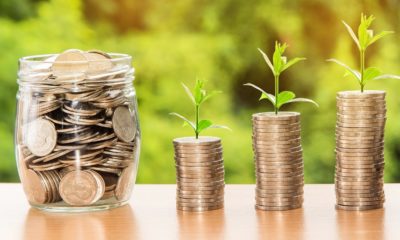Featured
Why ESG is currently gaining momentum on the capital market
According to an analysis by Union Investment, before the coronavirus, around 72% of all institutional investors took sustainability criteria into account in their investment decisions. Small and medium caps run the risk of being cut off from sources of capital in the future or have to expect that the cost of capital will increase enormously in the future if they neglect the ESG criteria.

A survey conducted by JP Morgan showed that the corona crisis is an accelerator for sustainable investments.
Investment companies managing a total of $13 trillion are 55% convinced that COVID-19 will drive sustainable investment in the next three years. The demand for sustainable investment products is growing exponentially, and not only to do good. Companies with a better ESG rating are more successful on the stock market.
If you want to read the latest economic news and to find out why ESG criteria is currently so important, download for free the Born2Invest mobile app, available for both Android and iOS phones.
The Corona crisis is proof of this
Fidelity and Deka recently found that the better the ESG rating of a company, the more robust its performance. This finding is not surprising. Even before the coronavirus pandemic, according to an analysis by Union Investment, around 72% of all institutional investors took sustainability criteria into account in their investment decisions.
By the end of 2019, almost 2,400 investors and asset managers had signed the United Nations’ Principles of Responsible Investment (PRI). They represent a cumulative asset volume of around $85 trillion.
The abbreviation ESG is gaining in clout. In the current crisis it is becoming apparent that the two aspects “S” for social and “G” for corporate governance are now more important than the classic “E” for the environment. ESG is becoming GSE, so to speak.
Backlog demand for second-line stocks
The trend towards corporate responsibility on the capital market is not new. Over the past decade, large corporations have expanded their environmental reports into comprehensive sustainability reports, set up entire CSR departments and in some cases integrated the topic of sustainability into their corporate strategy. As a result, these companies have extensive ESG programs and data. Their “sustainable” performance is continuously examined by ESG rating agencies. Almost all DAX companies report on the UN Sustainable Development Goals (SDGs) and their relation to their business activities. In the SDAX, however, only slightly more than one third of them do so.
At the moment, small caps in particular generally do not have the internal resources to develop comprehensive ESG programs or a corresponding reporting system. In the case of small caps, there is a lack of data in particular. It is currently hardly possible for investors to find reliable ESG information, as there is usually little or no disclosure. This requires a proactive commitment on the part of investors, who at best approach the Executive Board and Supervisory Board directly or indirectly via ESG analysts. As a result, small and mid-caps are often poorly positioned with regard to relevant data and strategies on environmental, social, and corporate governance issues.
ESG information becomes a prerequisite Investments
For small and medium-sized listed companies, the issues “environment”, “social” and “governance” are a major challenge, if not a threat. They run the risk of being cut off from sources of capital in the future or have to expect that the cost of capital will increase enormously in the future if they neglect this topic.
They will fall through the ranks of many investors in the future if they do not process relevant ESG information and make it available to investors or rating agencies. In addition, they will then also be cut off on the debt side by a dynamically developing market for green and sustainable financing.
ESG ratings are gaining in importance
In the meantime, various providers of sustainability ratings have established themselves in the market, ranking companies in terms of ESG criteria – similar to the well-known credit ratings.
The market for ESG ratings is in a state of flux. Morningstar recently acquired Sustainalytics, CVC invested in Ecovdais, and RobeccoSAM’s ESG business was acquired by S&P earlier this year. Previously, Moody’s major shareholder of Vigeo Eiris and Oekom Research was acquired by voting rights advisor ISS. This illustrates the future importance of ESG ratings. They will probably soon take on a similar position to equity research and credit ratings.
ESG ratings assess the non-financial performance of a company (environmental, social, governance). There is still no defined standard for this. Each rating agency uses its own (subjective) ESG rating methodology. The ratings are primarily based on publicly available data and reports from the companies, plus questionnaires. Ratings can be carried out on behalf of the company or unsolicited (e.g. on behalf of investors). One thing is clear: missing ESG information has a negative impact on the judgment.
This is where small and medium-sized enterprises should or must become active. The necessary ESG strategies and programs cover a wide range of issues that are not traditionally part of the financial analysis but are considered financially relevant.
New requirements for investor relations and ESG reporting
Every beginning is hard. However, investors welcome it when a company identifies the key ESG criteria and works to support them with measures and data over time. Doing nothing is no longer an option. It is about more than meeting the legal obligations of the CSR Directive Implementation Act. But this is a good starting point.
The first step in setting up ESG reporting is to identify the key issues and the status quo and compare them with the industry benchmark. That is followed by a gap analysis, on the basis of which an individual sustainability program is developed, consisting of concrete data, targets, and measures. This can then be integrated into all capital market communication and serves as the basis for an ESG rating.
Ultimately, the ESG program becomes truly sustainable when it is embedded in the corporate strategy. In this way, even small or mid-caps will be able to benefit in the future from the dynamically growing, sustainable sources of capital on the equity and debt sides.
__
(Featured image by annca via Pixabay)
DISCLAIMER: This article was written by a third party contributor and does not reflect the opinion of Born2Invest, its management, staff or its associates. Please review our disclaimer for more information.
This article may include forward-looking statements. These forward-looking statements generally are identified by the words “believe,” “project,” “estimate,” “become,” “plan,” “will,” and similar expressions. These forward-looking statements involve known and unknown risks as well as uncertainties, including those discussed in the following cautionary statements and elsewhere in this article and on this site. Although the Company may believe that its expectations are based on reasonable assumptions, the actual results that the Company may achieve may differ materially from any forward-looking statements, which reflect the opinions of the management of the Company only as of the date hereof. Additionally, please make sure to read these important disclosures.
First published in goingpublic.de, a third-party contributor translated and adapted the article from the original. In case of discrepancy, the original will prevail.
Although we made reasonable efforts to provide accurate translations, some parts may be incorrect. Born2Invest assumes no responsibility for errors, omissions or ambiguities in the translations provided on this website. Any person or entity relying on translated content does so at their own risk. Born2Invest is not responsible for losses caused by such reliance on the accuracy or reliability of translated information. If you wish to report an error or inaccuracy in the translation, we encourage you to contact us.

-

 Business1 week ago
Business1 week agoTopRanked.io Weekly Affiliate Digest: What’s Hot in Affiliate Marketing [Best Technology Affiliate Programs]
-

 Business5 days ago
Business5 days ago2.5 Billion People Watch Quiz Shows Every Day. Masters of Trivia (MOT) Is Letting Them Compete
-

 Crypto2 weeks ago
Crypto2 weeks agoBitcoin Steady Near $68K as ETF Outflows and Institutional Moves Shape Crypto Markets
-

 Crypto6 hours ago
Crypto6 hours agoMiddle East Tensions Shake Crypto as Bitcoin and Ethereum Slip























